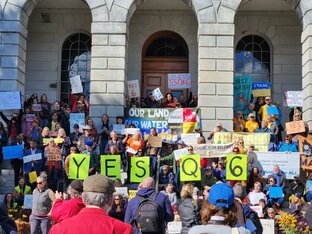Click HERE to read MUUSAN's resolution in support of Wabanaki Sovereignty, made during the first session of the 131st Legislature.
Stand with Wabanaki
As Unitarian Universalists, we acknowledge that the land we now call Maine -- the land on which our churches are built -- is the ancestral land of the Wabanaki Tribes. But land acknowledgements must be more than mere ritual acts. As UUs we are called to work actively on de-colonizing our institutions, to examine the painful history of tribal-state relations in Maine, and to commit ourselves to become anti-racists and allies to the tribes.
Background
Maine’s four remaining tribes (Penobscot Nation, Passamaquoddy Tribe, Mi'kmaq Nation and Houlton Band of Maliseet) lost their right to self-govern in a settlement in 1980, the Maine Indian Claims Settlement Act (MICSA) and its accompanying state law, the Maine Implementing Act (MIA). The State of Maine assumed jurisdiction over the tribes, treating them as simply the equivalent of municipalities. The settlement acts severely limited the tribes’ rights and blocked access to federal programs that have extended benefits to the 570 other Federally Recognized Tribes.
After almost 40 years of conflict and litigation between the State of Maine and the Tribes over the correct interpretation of the settlement acts’ provisions, the Maine Legislature formed a bipartisan Task Force in 2019 that examined problems with the settlement acts and made consensus recommendations for amendments. This resulted in proposed legislation to implement these recommendations.
Maine’s four remaining tribes (Penobscot Nation, Passamaquoddy Tribe, Mi'kmaq Nation and Houlton Band of Maliseet) lost their right to self-govern in a settlement in 1980, the Maine Indian Claims Settlement Act (MICSA) and its accompanying state law, the Maine Implementing Act (MIA). The State of Maine assumed jurisdiction over the tribes, treating them as simply the equivalent of municipalities. The settlement acts severely limited the tribes’ rights and blocked access to federal programs that have extended benefits to the 570 other Federally Recognized Tribes.
After almost 40 years of conflict and litigation between the State of Maine and the Tribes over the correct interpretation of the settlement acts’ provisions, the Maine Legislature formed a bipartisan Task Force in 2019 that examined problems with the settlement acts and made consensus recommendations for amendments. This resulted in proposed legislation to implement these recommendations.
131st Legislature Second Session Update:
Wabanaki Sovereignty Ally Team - Chair Meret Bainbridge
Priority Bill: LD 2007 - An Act to Advance Self-determination for Wabanaki Nations
MUUSAN members are asked to submit written testimony. Follow guidelines on the Wabanaki Alliance LD 2007 Toolkit
A sample testimony from a UU perspective is here.
Wabanaki Sovereignty Ally Team - Chair Meret Bainbridge
Priority Bill: LD 2007 - An Act to Advance Self-determination for Wabanaki Nations
- This bill seeks to amend the 1980 Maine Indian Claims Settlement Implementing Act to include the 22 Task Force recommendations from January 2020.
- The bill text is available as a sponsor amendment: LD 2007 Bill Language
MUUSAN members are asked to submit written testimony. Follow guidelines on the Wabanaki Alliance LD 2007 Toolkit
A sample testimony from a UU perspective is here.
Click here to reach the Wabanaki Alliance's 2024 Bill Tracker

